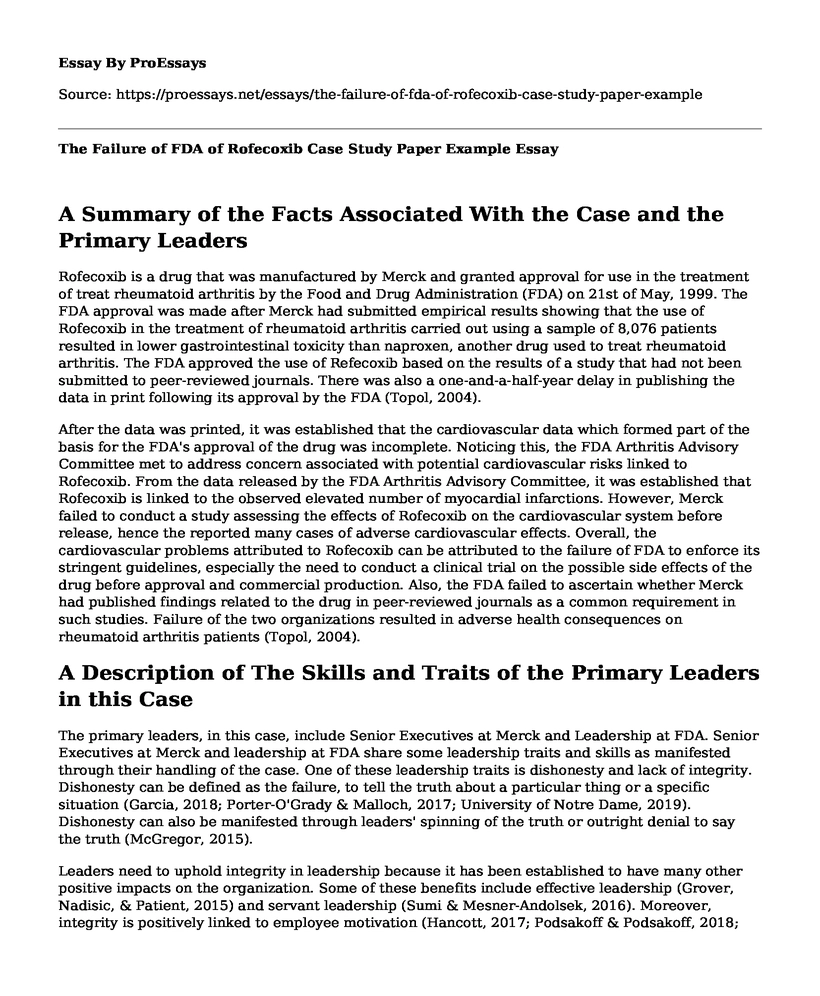A Summary of the Facts Associated With the Case and the Primary Leaders
Rofecoxib is a drug that was manufactured by Merck and granted approval for use in the treatment of treat rheumatoid arthritis by the Food and Drug Administration (FDA) on 21st of May, 1999. The FDA approval was made after Merck had submitted empirical results showing that the use of Rofecoxib in the treatment of rheumatoid arthritis carried out using a sample of 8,076 patients resulted in lower gastrointestinal toxicity than naproxen, another drug used to treat rheumatoid arthritis. The FDA approved the use of Refecoxib based on the results of a study that had not been submitted to peer-reviewed journals. There was also a one-and-a-half-year delay in publishing the data in print following its approval by the FDA (Topol, 2004).
After the data was printed, it was established that the cardiovascular data which formed part of the basis for the FDA's approval of the drug was incomplete. Noticing this, the FDA Arthritis Advisory Committee met to address concern associated with potential cardiovascular risks linked to Rofecoxib. From the data released by the FDA Arthritis Advisory Committee, it was established that Rofecoxib is linked to the observed elevated number of myocardial infarctions. However, Merck failed to conduct a study assessing the effects of Rofecoxib on the cardiovascular system before release, hence the reported many cases of adverse cardiovascular effects. Overall, the cardiovascular problems attributed to Rofecoxib can be attributed to the failure of FDA to enforce its stringent guidelines, especially the need to conduct a clinical trial on the possible side effects of the drug before approval and commercial production. Also, the FDA failed to ascertain whether Merck had published findings related to the drug in peer-reviewed journals as a common requirement in such studies. Failure of the two organizations resulted in adverse health consequences on rheumatoid arthritis patients (Topol, 2004).
A Description of The Skills and Traits of the Primary Leaders in this Case
The primary leaders, in this case, include Senior Executives at Merck and Leadership at FDA. Senior Executives at Merck and leadership at FDA share some leadership traits and skills as manifested through their handling of the case. One of these leadership traits is dishonesty and lack of integrity. Dishonesty can be defined as the failure, to tell the truth about a particular thing or a specific situation (Garcia, 2018; Porter-O'Grady & Malloch, 2017; University of Notre Dame, 2019). Dishonesty can also be manifested through leaders' spinning of the truth or outright denial to say the truth (McGregor, 2015).
Leaders need to uphold integrity in leadership because it has been established to have many other positive impacts on the organization. Some of these benefits include effective leadership (Grover, Nadisic, & Patient, 2015) and servant leadership (Sumi & Mesner-Andolsek, 2016). Moreover, integrity is positively linked to employee motivation (Hancott, 2017; Podsakoff & Podsakoff, 2018; Sathiyaseelan, 2015).
In the current case involving a drug manufactured by Merck, dishonesty of Merck's and FDA's leaders was there from the onset. Despite these leaders' knowledge that the Rofecoxib, a drug manufactured by Merck, had adverse cardiovascular health impacts on the patients, Merck went ahead and cheated or misinformed the public and the patients through publications that Rofecoxib had "Favorable Cardiovascular Safety of Viox." Additionally, Merck, under the watch of FDA, further lied to the public that the Rofecoxib had cardioprotective effects. This is despite their knowledge and awareness that valid and reliable empirical studies have proven the opposite, that Rofecoxib had adverse cardiovascular effects on the users.
References
Garcia, H. F. (2018). The dangers of dishonesty. Retrieved from https://www.forbes.com/sites/forbescoachescouncil/2018/03/27/the-dangers-of-dishonesty/
Grover, S. L., Nadisic, T., & Patient, D. L. (2015). Perspectives on ethical leadership. Abingdon, UK: Routledge.
Hancott, D. (2017). Leadership is what?: the importance of vision, integrity, and developing others: the importance of vision, integrity, and developing others. Morrisville, NC: Lulu.com.
McGregor, J. (2015). The honest truth about political leaders' dishonesty. Retrieved from https://www.washingtonpost.com/news/on-leadership/wp/2015/12/01/the-honest-truth-about-political-leaders-dishonesty/
Peters, D. H. (2014). The application of systems thinking in health: why use systems thinking? Health Research Policy and Systems, 12(1), 51. https://doi.org/10.1186/1478-4505-12-51
Podsakoff, P. M., & Podsakoff, N. P. (2018). The oxford handbook of organizational citizenship behavior. Oxford, OX: Oxford University Press.
Ribiere, D. V. (2018). Icmlg 2018 6th international conference on management leadership and governance. Wood Lane, UK: Academic Conferences and publishing limited.
Sathiyaseelan, S. (2015). The 21st century administrative leader. Partridge Publishing Singapore.
Sumi, R., & Mesner-Andolsek, D. (2016). The integrity of the servant leader. Abingdon, UK: Taylor & Francis.
Topol, E. J. (2004). Failing the public health-rofecoxib, Merck, and the FDA. New England Journal of Medicine, 351(17), 1707-1709.
Cite this page
The Failure of FDA of Rofecoxib Case Study Paper Example. (2022, Dec 12). Retrieved from https://proessays.net/essays/the-failure-of-fda-of-rofecoxib-case-study-paper-example
If you are the original author of this essay and no longer wish to have it published on the ProEssays website, please click below to request its removal:
- Research Paper on Gestational Diabetes Mellitus
- Paper Example on Leadership, Management, and Planning in Healthcare
- Exercising of Theoretical Nursing Practices on the Actual Field - Paper Example
- Essay on Blood Test: Check Cell Count, Vitamin B12, Iron, Protein, Retinol-Binding Protein & Albium
- Essay Example on Creating a Project Charter: Essential for Project Success
- Paper Example on Leadership: Strategies for Successful People Management
- Essay Example on Difference Between Quality Improvement & Quality Assurance







